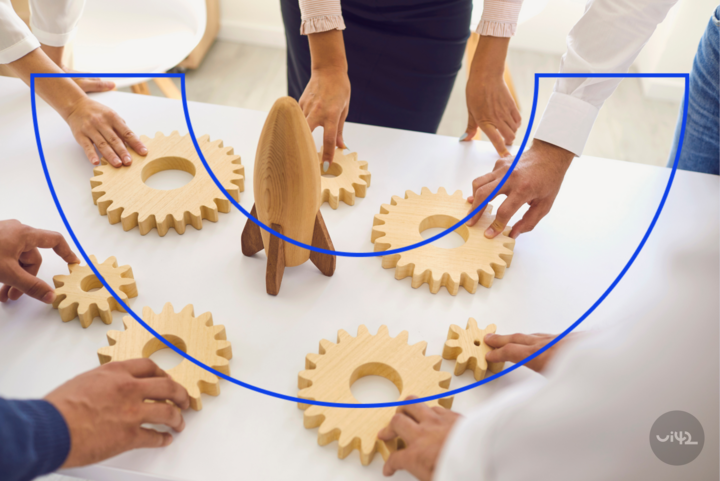B2B and B2C are two terms you've definitely come across in e-commerce and online marketing. However, if you still don't know exactly what the difference between them is and how much they should influence your marketing strategy if it is to be successful, read on. In this article, we have therefore summarized important information about the differences between B2B and B2C, which will help you better understand how to effectively reach and serve your customer.

What is B2B?
B2B is an abbreviation from the English term business-to-business. It translates to business relationship between two business partners – companies or corporations. The cornerstone of this model is building trust and proper business relationships with a B2B partner. Detailed assessment of competitive advantages from a long-term perspective and also emphasis on the overall value of the purchase. What are the main features of B2B sales?
In B2B, the purchase has a higher volume and value
In business transactions where another company is the target customer, the purchase volume is usually much larger. Companies buy for a larger number of end-users (employees or their own end customers), which, of course, also increases the value of the purchase.
The B2B sales procurement process is more complicated and longer
First of all, it involves a longer approval process. Preceding a binding order for goods or services can be, for example, a tender or procurement, or just a usual comparison of price offers. The entire assessment may be subject to complicated and often lengthy internal processes before the final offer reaches the competent person who has the right to decide on the purchase. Also, the service and technical side of the sale in terms of payment and invoicing requires a more complex system and processes on the seller's side. According to statistics, up to 30% of the total share of closed B2B sales takes between 1 to 3 months. Of course, the higher the value of the trade, the longer the time.
B2B partners build long-term relationships
This, quite logically, follows from the above point. While the entire procurement process, decision-making, and subsequent purchase realization take place, it also costs the B2B partner effort, which they do not want to repeat with every subsequent purchase need. Therefore, it is true that in this model business relationships are rather long-term and purchases are repeated.
What is B2C?
B2C is an abbreviation from the English business-to-consumer. In this business relationship, it is about selling products or services directly to the end customer. The most common channel is a brick-and-mortar store or an online store within e-commerce. What characterizes B2C?
In B2C, even a lower purchase value is significant
This is characteristic for an individual customer. We are talking easily about tens of euros. However, if we consider the wide range that B2C sales bring even when scaled to individual target groups, the total sales volume multiplies.
Quick and emotional decisions
For B2C, a purchase based on current need or simple emotion is characteristic. I like it – I'll buy it. And that even at that moment, without long decision-making and planning. Therefore, it is crucial brand perception, its building, and targeted communication to the customer using online marketing channels that can reach him (advertising in the media, social networks, etc.).
In B2C, the customer and his experience come first
User experience – user experience (abbreviation UX) or customer experience – customer experience (abbreviation CX) are two terms that significantly decide whether a customer will make a purchase. And whether a random one turns into a loyal one. While UX reflects the experience the customer had when interacting with the e-shop or application where they shop, CX goes even further and talks about the overall perception of the company and its products, within details such as customer support or care after purchase.
UIČKOVSKÝ TIP: While abroad, owners of e-shops and stores place great emphasis on UX and CX and strive to tune their sales channels to be as customer-friendly as possible, in Slovakia this segment is still awakening. Are you interested in more about how to pluck the right string with your customers in B2C sales? Read why UX, CX, and the customer are the most important for the web?
What are the main differences between B2B and B2C?
The differences between the B2B and B2C segments, their understanding, and implementation into internal processes in the company are exactly what can direct a starting business the right way or reveal why sales of an already established business are stagnating. We have therefore summarized the basic areas in which understanding the functioning of one or the other model, or their combination, can bring a completely new wind into the sails.
Strategy: How does B2C and B2B marketing differ?
B2B marketing should focus mainly on building mutual business relationships and trust between B2B partners. A great benefit to demonstrate your expertise are case studies, webinars, personal meetings or creating unique content in the form of expert articles full of expertise. A marketing strategy focused on the B2C segment includes for example effective advertising, communication on social networks, targeted and well-segmented email marketing.
Sales channels and tools – B2B sales vs. B2C
Customers in the B2C segment shop through an e-shop or a brick-and-mortar store. Recently, mobile applications are becoming increasingly attractive, in which personalization of the purchase is easier to apply. In B2B it is most often about direct sales, especially in the case of specific products or high-value goods. However, a custom B2B e-shop is not an exception either. Companies often use sales representatives who present the goods and help to realize the order. In the context of online sales, very effective are ERP systems of the B2B partner connected directly with the e-shop solution or CRM system with other very useful extensions and functions.
How does the decision-making process about purchasing differ between B2B and B2C customers?
B2B segment is interwoven with responsible persons and experts who bear responsibility for the purchase of a product or service. They consider efficiency and long-term business relationships in case of repeated or regular orders. Before they decide to buy, analyses, studies, and discussions at various levels precede it. That's why the entire sales process is much longer and often includes several rounds of approval. B2C customers decide for themselves or a smaller circle of people (family, roommates, etc.). They are motivated by emotions or, on the other hand, price comparison plays a big role. The decision whether to buy or not is compared to B2B sales faster and often impulsive.
Complexity of products and custom solutions are of great importance in B2B
The sales portfolio of B2C products is composed so that the goods in their final form are usable for a large group of customers. An example is a blue toothbrush with soft bristles. The seller tries to fine-tune the product with an emphasis on meeting the needs of the target group, which reaches a larger number of individuals – end consumers. On the other hand, there are B2B products, often of much higher value and technically or structurally more complex (software, technology, production line, etc.), which require adaptation for the end corporate customer or company.
The differences between B2B and B2C are decisive if you are currently creating a marketing strategy or looking for the most effective sales channel. While in the case of B2C, brick-and-mortar stores and e-shops work, in B2B, online solution requires a different approach. Are you interested in more about how to get the most out of it? At ui42, we will be happy to build a fine-tuned B2B e-shop for you with bulk orders, support for sales representatives, individual prices for B2B partners, and processes that will save you time and costs.
```












